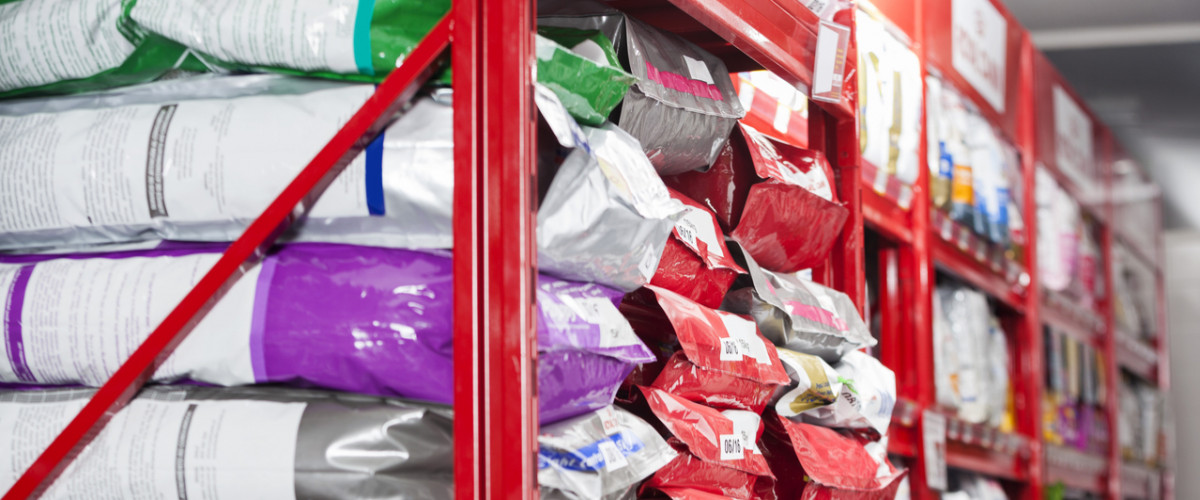1. Buy in bulk

Bulk pet food at store
Save money by bulk-buying items with a long shelf life or that won't expire. These items include puppy pee training pads, poop bags, cat litter, cat toys, canned food, dry food and bedding for fish and small animals.
If the thought of lugging home oversized packages makes your back hurt, check online retailers such Amazon, where these goods are delivered right to your front door. It you’re an Amazon Prime member, you’ll enjoy free shipping, and some pet products come with recurring delivery options, which save you even more money.
If you're already signed up for a warehouse club such as Costco, then you're already set to take advantage of bulk pricing for certain pet supplies. Pro tip: Head to the pet aisle to pick up a box of 100 pee pads — it's the best deal in town.
Empower your investments with Qtrade
Discover Qtrade's award-winning platform and take control of your financial future. With user-friendly tools, expert insights, and low fees, investing has never been easier.
Start Trading Today2. Invest in pet insurance

When covering pet expenses, pet insurance is one of the most useful tools pet owners have. Sure, you've got to shell out a certain amount a month, but spending today may save you thousands in the future if your pet becomes ill unexpectedly.
Pet insurance providers — such as Fetch — offer flexible, comprehensive coverage at a monthly rate.
With pet insurance, you can be sure that you have coverage on any given day and can handle surprise vet costs — such as an exam fee, prescription medicine or even cancer treatment — without breaking the bank.
Fetch has flexible offerings based on your needs and the type of pet you have. With so many options available, you can find the coverage that best suits you and your pet.
Fetch is rated Excellent on TrustPilot and has partnered with the Ontario SPCA. Even better, it can be used with any veterinarian in Canada, so you don’t have to worry about hunting for a covered vet during an emergency
3. Come up with a pet budget

Budgeting is an essential part of managing costs, even when it comes to pets. From the moment your furry BFF comes homes to well into their senior years, you can budget and prepare for expected costs.
Even if you’re just starting your search for a pet, you’ll still need to budget — make sure you account for everything from adoption/breeder fees to health care, essential supplies and more.
Develop a budget not only helps you save money, but it also ease stress. A clear expectation of how much your furry family member costs will help with financial planning.
Unexpected vet bills don’t have to break the bank
Life with pets is unpredictable, but there are ways to prepare for the unexpected.
Fetch Insurance offers coverage for treatment of accidents, illnesses, prescriptions drugs, emergency care and more.
Plus, their optional wellness plan covers things like routine vet trips, grooming and training costs, if you want to give your pet the all-star treatment while you protect your bank account.
Get A Quote4. Medical prevention

There are two ways to save money when it comes to your pet's health. First, pet insurance — such as Fetch — is a good way to avoid spending a large sum on an unexpected medical crisis.
You can also work to prevent a health problem before it occurs, which will be a boon to both your wallet and your pet's well-being.
Doing what you can to keep your pet as healthy as possible will reduce the likelihood of a costly medical problem. Make sure your pet is fed a nutritious diet, gets plenty of exercise and receives regular veterinary checkups. Depending on your chosen coverage, Fetch covers care such as veterinary exams, diagnostic tests, ultrasounds and breed-specific hereditary conditions, to make sure your furry friend stays in good shape.
5. Train your dog at home

German Shepherd training (Sit command)
Seek help from a professional trainer if your dog is extremely reactive, fearful, has deeply ingrained behavioral issues or is stronger than you. But if you don't have the means to pay for a dog trainer, then consider using a reward-based system at home.
Reward-based training just means training your dog with treat rewards. This also happens to be the Humane Society's preferred positive and cruelty-free training method.
One simple example of reward-based training is teaching your dog to sit before giving him his meal. YouTube now has an amazing selection of free positive-reinforcement training resources.
6. Groom your pet at home

Getting your long-haired, long-eared, long-nailed pet professionally groomed can cost a lot
Some home grooming is super easy, including brushing your long-haired pet frequently to avoid mats. You also can brush pets' teeth (which will help save on dental bills), clean their ears and bathe pets at home.
As with dog training, there are some situations when it's best to call in the professionals. A seriously matted dog, a pet whose nails haven't been trimmed in years, or a fearful animal may best be handled by a pro.
If you groom your pet at home, keep things positive. Use rewards during and after the process to keep your pet interested and happy. To ensure best results, start handling and grooming your pet when it's young.
7. Spay or neuter your pet

There are many economical, practical, and ethical reasons to spay or neuter your pet
North America has a major pet overpopulation problem, and it's partly due to unsterilized pets creating unplanned litters. There are many economical and ethical reasons to spay or neuter your pet.
When you leave a male cat intact, it wants to mark territory, find a mate (or 10) and fight with other males. Dogs are more aggressive, and larger breed pooches are more susceptible to cancer when they're not neutured. Unspayed females of both species mark territory or have pee accidents and must be kept away from males to avoid unplanned litters.
Getting your pet fixed is simply doing your part to reduce the overpopulation problem. And you'll save money in numerous ways, such as not having to clean up territory markings or spend on a s lew of pee pads/diapers.
8. DIY toys and treats

Skip the expensive pet store toys and save your money! Many mass-produced plastic pet toys are poorly constructed and can break easily, potentially becoming a safety hazard. Instead, focus on creating engaging DIY toys that your pets will love just as much, if not more.
For cats, simple household items can provide hours of entertainment. They naturally gravitate toward cardboard boxes which become instant fortresses and paper balls that mimic prey. Dogs are equally content with homemade toys, such as braided fleece blankets or old t-shirts (bonus because they smell like you) that make perfect tug toys, or a secure sock containing an empty water bottle for a satisfying crinkly sound.
During the holidays, I’ve found that homemade dog treats are great to give as gifts to other pet parents. Just add them to a reusable jar or a festive bag, affix a tag and prepare to be the most popular guest in the house. If you're a treat-making noob, try out this easy peanut butter and pumpkin dog treat recipe. It's chock full of healty ingredients that are good for dogs and chances are, you've got most of them in your kitchen already.
Sources
1. HABRI: How Pets Impact Our Mental Health (May 2, 2024)
2. ThatFluffingDog: Easy Peanut Butter and Pumpkin Dog Treat Recipe
Trade Smarter, Today
Build your own investment portfolio with the CIBC Investor's Edge online and mobile trading platform and enjoy low commissions. Get 100 free trades and $200 or more cash back until March 31, 2025.









